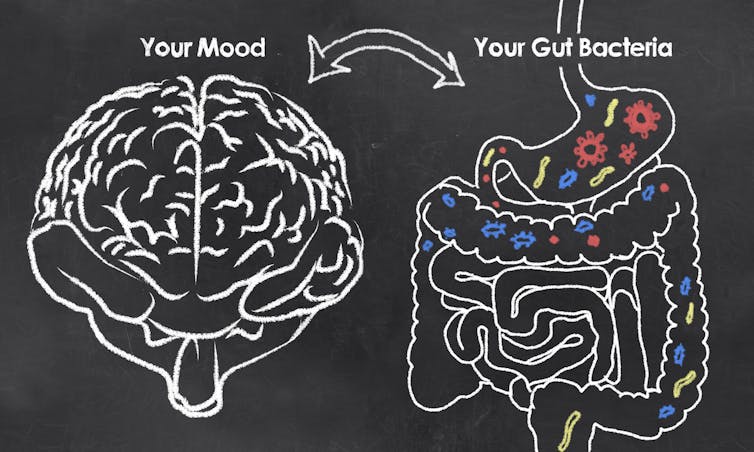
Imagine that you’re a police officer. You spot a car ahead that is swerving all over the road. You pull the driver over and she’s clearly intoxicated. With slurred speech, she swears that she hasn’t had a drop of alcohol all day. Would you believe her?
In 2016, a woman who had a blood alcohol level four times the legal limit was acquitted of her DUI charge after it was discovered that she had an extremely rare condition called “auto-brewery syndrome.” People with this syndrome carry microbes in their intestines that produce abnormally high levels of alcohol, which they produce when they break down sugars and carbohydrates.
While auto-brewery syndrome is an extreme example, it makes one wonder: Could intestinal microbes be influencing other health or behavioral traits? Jing Yuan at the Capital Institute of Pediatrics in Beijing published a new study in Cell Metabolism showing that an intestinal microbe may cause fatty liver disease by producing high levels of alcohol.
I am a microbiologist and am intrigued by the roles intestinal microbes – known collectively as the microbiome – play in human health. As the author of the book, “Pleased to Meet Me: Genes, Germs, and the Curious Forces That Make Us Who We Are,” I have done extensive research into how our microbiome affects our health, moods and behavior.
Diseased liver, without drinking
The accumulation of excess fats in the liver can cause serious health problems, including inflammation, which can lead to cirrhosis (scarring) and liver cancer. Most people associate fatty liver disease with alcoholism; however, nonalcoholic fatty liver disease, which affects a surprising 80 to 100 million Americans, arises without excessive alcohol intake.
There appear to be multiple causes of NAFLD such as obesity, insulin resistance, high cholesterol or hepatitis C infection. Now Yuan and her colleagues may have identified another.
The discovery occurred when physicians identified a patient who was suffering from both auto-brewery syndrome and severe NAFLD. When researchers examined stool samples from the patient, they found a species of bacteria called Klebsiella pneumoniae. This particular strain of K. pneumoniae was making between four and six times the quantity of alcohol that strains of the same bacteria make in healthy people. This prompted Yuan and her team to examine a cohort of 43 other patients with NAFLD. They discovered that 61% of them possessed K. pneumoniae excreting unusually high amounts of alcohol. Among 48 healthy people, only 6% contained such bacteria.
Read Also: How to make the perfect cup of coffee
The team noted that K. pneumoniae bacteria were only slightly more abundant in the intestines of NAFLD patients. It was the quantity of alcohol that the microbes produced that differed. But could the excessive alcohol being made by the bacteria actually give rise to fatty liver?
Some people have a bacteria microbrewery in their gut
To address the question of causality, the scientists fed the high alcohol-producing K. pneumoniae bacteria to healthy mice. Within one month, these mice developed measurable symptoms of fatty liver, which progressed to cirrhosis within two months. The bacterial-triggered liver disease followed the same timeline the researchers observed when they fed the mice pure alcohol.
Looking for more evidence that these microbes were really to blame for fatty liver, the researchers transferred intestinal material from either mice or humans with NAFLD into healthy mice. When intestinal material from either humans or mice with NAFLD was transplanted into healthy mice, the healthy animals developed fatty liver damage.
The final proof was delivered when the researchers treated the intestinal material harvested from NAFLD mice with a virus that only kills Klebsiella. When intestinal material free of Klebsiella was transplanted into healthy mice, they didn’t develop any disease.

T. L. Furrer
The results suggest, for the first time, that certain K. pneumoniae bacteria make excessive alcohol that can lead to fatty liver. This suggests that some K. pneumoniae-induced cases of fatty liver might be treatable with antibiotics. This worked when mice with K. pneumoniae-induced fatty liver were treated with the antibiotic imipenem, which reversed progression of the disease.
Since the K. pneumoniae bacteria convert sugar to alcohol, physicians may soon be able to diagnose this form of fatty liver with a simple blood test to measure blood alcohol levels in response to sugar. Yuan and her team showed that mice harboring the alcohol-producing Klebsiella bacteria became inebriated and showed increased blood alcohol levels after consuming sugar.
These are exciting findings. However, since all the participants in the study were from a Chinese cohort, it isn’t clear whether the phenomenon is widespread. Klebsiella bacteria are commonly found in human intestines, but it is unknown why some people harbor strains that make high levels of alcohol.
In the bigger picture, the study further illustrates the importance of the microbiome in regulating mood and behavior. Some people may contain intestinal microbes that are secreting alcohol, which might make them act as if they were drinking when in fact they only ate a sweet dessert, as was the case with the woman charged with DUI. Another interesting question that arises is whether these individuals have a greater tolerance for alcohol since they would be exposed to it constantly.
Bill Sullivan, Professor of Pharmacology & Toxicology, Indiana University
This article is republished from The Conversation under a Creative Commons license. Read the original article.